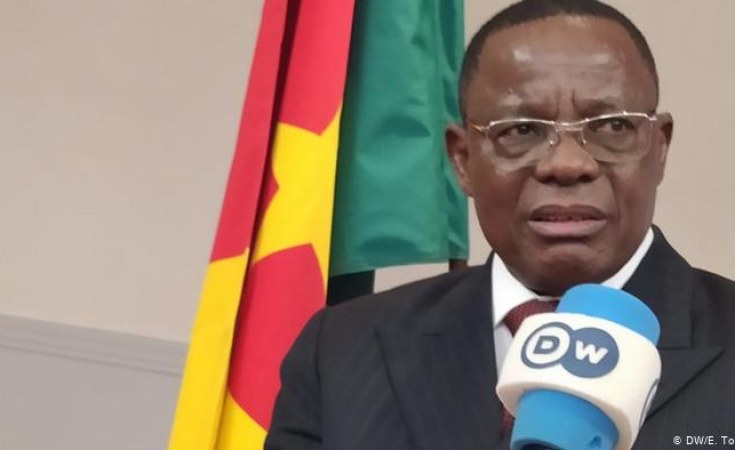Over four months after his release from prison, Cameroon’s opposition leader Maurice Kamto is in Europe to meet with the diaspora community. He spoke with DW about his experience in jail, why he thinks open dialogue is an essential tool when it comes to solving the Anglophone crisis and the reasoning behind his decision to boycott the upcoming election in February.
DW: As opposition leader, you have called for a boycott of the elections in Cameroon this year. Why?
Maurice Kamto: These elections are not going to change anything. There’s a multifaceted crisis in our country. [We have] the current situation in the north-west and south-west, the so-called Anglophone regions of Cameroon. It’s sad when you think about it that there has been an ongoing war for the past three years in our own country. Cameroonians are fighting Cameroonians. And we are still not able to settle the matter. There is something wrong there, and it is something I can’t understand. If you lead a country, you should make sure that you address the concerns of the people. If people in the English-speaking part of the country say that they have a problem with the government, and you tell them you don’t care, it means that there is something wrong. With the situation in the English-speaking part of the country and the whole electoral holdup in 2018, that’s why we made the decision not to participate in this year’s elections. But that doesn’t mean we shy away from democracy. We made the decision to go into power peacefully through elections. This has been our path since the very beginning of the Cameroon Renaissance Movement (MRC). Making the decision not to participate in the polls does not mean that we are not part of the democratic game. It is just that we were upset with the situation, and we tried to reach out to the government by sending them a clear message. But they never listened. We extended a peaceful hand to sit down and make a consensual reform of the electoral system.
You spent nine months in prison last year after facing charges of insurrection. Can you tell us a bit about your experience?
The prison is not a place where you would like to send somebody, even your enemy. And especially in Cameroon. What shocked me the most was the torture against many of our militants. So, that was a matter of concern because people are still being tortured today in Cameroon. Prison has not changed my commitment and my faith in the future of Cameroon.
In prison, you met with leaders of the separatist movement who were also arrested. What did you discuss with them?
We met as prisoners. The only thing I can say is that they are people you can talk to. And that’s why I keep on saying that we can solve the problem politically if there is a will. But there is no trust anymore in the current government. And the mistrust is terrible, but it comes down to dialogue. If you are not trustful of somebody, you can’t do anything seriously.
There is this question of what you can do as far as the Anglophone crisis is concerned. You are a renowned political figure in Cameroon; you have a lot of contacts on the international scene. What have you been able to do to solve this crisis?
To propose a new way of handling the matter. First of all, involve all the stakeholders in the dialogue. When we speak of inclusive dialogue, it means that we should bring all the stakeholders around the table. All of them. Including the representatives of armed groups, separatists, and those who were sentenced to life and are still in prison. Because if you don’t talk to people, you can’t convince them. Why should you impose your view or your agenda on others? Bring them to the table and explain why this decision is probably not a good option. Bring them around the table. But before you do that, make sure you negotiate a ceasefire with those who are fighting that they lay their arms down. And bring some peace; cool down their hearts. Many of them have lost their villages which have been burnt to ashes and they would like to see if their [family] is still there. After that, they can take part in the discussion.
Read Also: Malawi Court Cancels Presidential Election Result
But what is your solution?
My position is quite clear. I said that decentralization is not a solution anymore. I clearly stated that the solution is federalism. I have always said that it is not two-state federalism. We’ll start with our own form, discuss it, and agree on what they would like to see in their own state as part of the federal government or system in Cameroon. And from there, you extend it to the rest of Cameroon because it’s not just the Anglophones who are asking for federalism today.
How would you want the world and your supporters in Cameroon to remember you?
I want my fellow compatriots and people abroad to see me as a Cameroonian who is dedicated to his country. And who will always do his best to bring peace and rebuild a new Cameroon where people live together where the youth have a place.
Interview: Maurice Kamto is Cameroon’s most prominent opposition leader
